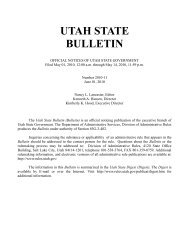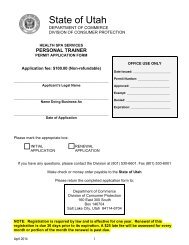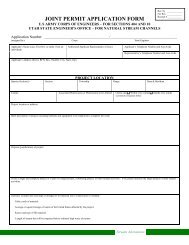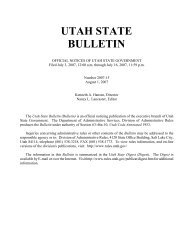NOTICES OF PROPOSED RULES DAR File <strong>No</strong>. 35575(5) Electrical outlets and surge protectors accessible tochildren age four and younger shall have protective caps or safetydevices when not in use.(6) Hot water accessible to children shall not exceed 120degrees Fahrenheit.(7) High chairs shall have T-shaped safety straps ordevices that are used whenever a child is in the chair.(8) Indoor stationary gross motor play equipment, such asslides and climbers, accessible to children under age 3 shall nothave a designated play surface that exceeds 3 feet in height.(a) If such equipment has an elevated designated playsurface less than 18 inches in height, it shall not be placed on a hardsurface, such as wood, tile, linoleum, or concrete, and shall have athree foot use zone.(b) If such equipment has an elevated designated playsurface that is 18 inches to 3 feet in height, it shall be surrounded bymats at least 2 inches thick, or cushioning that meets ASTMStandard F1292, in a three foot use zone.(9) Indoor stationary gross motor play equipment, such asslides and climbers, accessible to children age 3 and older shall nothave a designated play surface that exceeds 5-1/2 feet in height.(a) If such equipment has an elevated designated playsurface less than 3 feet in height, it shall be surrounded byprotective cushioning material, such as mats at least 1 inch thick, ina six foot use zone.(b) If such equipment has an elevated designated playsurface that is 3 feet to 5-1/2 feet in height, it shall be surrounded bycushioning that meets ASTM Standard F1292, in a six foot usezone.(10) There shall be no trampolines on the premises thatare accessible to any child in care.(11) If there is a swimming pool on the premises that isnot emptied after each use:(a) the provider shall ensure that the pool is enclosedwithin a fence or other solid barrier at least six feet high that is keptlocked whenever the pool is not in use;(b) the provider shall maintain the pool in a safe manner;(c) the provider shall meet all applicable state and locallaws and ordinances related to the operation of a swimming pool;and(d) If the pool is over four feet deep, there shall be a RedCross certified life guard on duty, or a lifeguard certified by anotheragency that the licensee can demonstrate to the Department to beequivalent to Red Cross certification, any time children have accessto the pool.(12) If wading pools are used:(a) a caregiver must be at the pool supervising childrenwhenever there is water in the pool;(b) diapered children must wear swim diapers and rubberpants while in the pool; and(c) the pool shall be emptied and sanitized after each useby a separate group of children.R430-60-13. Parent <strong>No</strong>tification and Child Security.(1) The provider shall post a copy of the Department'schild care guide in the center for parents' review during businesshours.(2) Parents shall have access to the center and theirchild's classroom at all times their child is in care.(3) The provider shall ensure the following proceduresare followed when children arrive at the center or leave the center:(a) Each child must be signed in and out of the center bythe person dropping the child off and picking the child up, includingthe date and time the child arrives or leaves.(b) Persons signing children into the center shall useidentifiers, such as a signature, initials, or electronic code.(c) Persons signing children out of the center shall useidentifiers, such as a signature, initials, or electronic code, and shallhave photo identification if they are unknown to the provider.(d) Only parents or persons with written authorizationfrom the parent may take any child from the center. In anemergency, the provider may accept verbal authorization if theprovider can confirm the identity of the person giving the verbalauthorization and the identity of the person picking up the child.(e) School age children may sign themselves in and outof the program with written permission from their parent.(4) The provider shall give parents a written report ofevery incident, accident, or injury involving their child on the dayof occurrence. The caregivers involved, the center director, and theperson picking the child up shall sign the report on the day ofoccurrence. If a school age child signs him or herself out of theprogram, a copy of the report shall be mailed to the parent, or givento the parent the next day the child attends the program.(5) If a child is injured and the injury appears serious butnot life threatening, the provider shall contact the parentimmediately, in addition to giving the parent a written report of theinjury.(6) In the case of a life threatening injury to a child, or aninjury that poses a threat of the loss of vision, hearing, or a limb, theprovider shall contact emergency personnel immediately, beforecontacting the parent. If the parent cannot be reached afteremergency personnel have been contacted, the provider shallattempt to contact the child's emergency contact person.R430-60-14. Child Health.(1) The licensee shall ensure that no child is subjected tophysical, emotional, or sexual abuse while in care.(2) All staff shall follow the reporting requirements forwitnessing or suspicion of abuse, neglect, and exploitation found in<strong>Utah</strong> Code, Section 62A-4a-403 and 62A-4a-411.(3) The use of tobacco, alcohol, illegal substances, orsexually explicit material on the premises or in center vehicles isprohibited any time that children are in care.R430-60-<strong>15</strong>. Child Nutrition.(1) If food service is provided:(a) The provider shall ensure that the center's mealservice complies with local health department food serviceregulations.(b) The provider shall offer meals or snacks at least onceevery three hours that a child is in care.(c) The provider shall serve children's food on dishes,napkins, or sanitary high chair trays, except for individual servingsize items, such as crackers, if they are placed directly in thechildren's hands. The provider shall not place food on a bare table.(2) If the parent of a child in care has informed theprovider that his or her child has a food allergy or sensitivity, theprovider shall ensure that the child is not given that food or drink.66 UTAH STATE BULLETIN, <strong>January</strong> <strong>15</strong>, <strong>2012</strong>, <strong>Vol</strong>. <strong>2012</strong>, <strong>No</strong>. 2
DAR File <strong>No</strong>. 35575NOTICES OF PROPOSED RULES(3) The provider shall ensure that food and drink broughtin by parents for an individual child's use is labeled with the child'sname, and refrigerated if needed. The provider shall ensure that achild in care does not consume a food or beverages that was broughtin for another child.R430-60-16. Infection Control.(1) Staff shall wash their hands thoroughly with liquidsoap and warm running water at the following times:(a) before handling or preparing food or bottles;(b) before and after eating meals and snacks or feedingchildren;(c) before and after diapering a child;(d) after using the toilet or helping a child use the toilet;(e) before administering medication;(f) after coming into contact with body fluids;(g) after playing with or handling animals;(h) when coming in from outdoors; and(h) after cleaning or taking out garbage.(2) The provider shall ensure that children wash theirhands thoroughly with liquid soap and warm running water at thefollowing times:(a) before and after eating meals and snacks;(b) after using the toilet;(c) after coming into contact with body fluids;(d) after playing with animals; and(e) when coming in from outdoors.(3) Only single use towels from a covered dispenser or anelectric hand-drying device may be used to dry hands.(4) The provider shall ensure that toilet paper isaccessible to children, and that it is kept on a dispenser.(5) The provider shall clean and sanitize all washabletoys and materials weekly, or more often if necessary.(6) Stuffed animals, cloth dolls, and dress-up clothesmust be machine washable. Pillows must be machine washable, orhave removable covers that are machine washable. The providershall wash stuffed animals, cloth dolls, dress-up clothes, and pillowsor covers weekly.(7) If water play tables or tubs are used, they shall bewashed and sanitized daily, and children shall wash their handsprior to engaging in the activity.(8) Persons with contagious TB shall not work orvolunteer in the center.(9) Children's clothing which is wet or soiled from bodyfluids:(a) shall not be rinsed or washed at the center; and(b) shall be placed in a leakproof container, labeled withthe child's name, and returned to the parent.(10) If the center uses a potty chair, the provider shallclean and sanitize the chair after each use.(11) The center shall have a portable body fluid clean upkit.(a) All staff shall know the location of the kit and how touse it.(b) The provider shall use the kit to clean up spills ofbody fluids.(c) The provider shall restock the kit as needed.(12) The provider shall notify the local healthdepartment, on the day of discovery, of any reportable infectiousdiseases among children or caregivers, or any sudden orextraordinary occurrence of a serious or unusual illness, as requiredby the local health department.(13) The provider shall post a parent notice at the centerwhen any staff or child has an infectious disease or parasite.(a) The provider shall post the notice in a conspicuouslocation where it can be seen by all parents.(b) The provider shall post and date the notice the sameday the disease or parasite is discovered, and the notice shall remainposted for at least 5 days.R430-60-17. Medications.(1) If medications are given, they shall be administered tochildren only by a provider trained in the administration ofmedications as specified in subsections (7) and (8) below.(2) All over-the-counter and prescription medicationsshall:(a) be labeled with the child's full name;(b) be kept in the original or pharmacy container;(c) have the original label; and,(d) have child-safety caps.(3) All non-refrigerated medications shall be inaccessibleto children and stored in a container or area that is locked, such as alocked room, cupboard, drawer, or a lockbox. The provider shallstore all refrigerated medications in a leakproof container.(4) The provider shall have a written medicationpermission form completed and signed by the parent prior toadministering any over-the-counter or prescription medication to achild. The permission form must include:(a) the child's name;(b) the name of the medication;(c) written instructions for administration; including:(i) the dosage;(ii) the method of administration;(iii) the times and dates to be administered; and(iv) the disease or condition being treated; and(d) the parent signature and the date signed.(5) If the provider keeps over-the-counter medication atthe center that is not brought in by a parent for their child's use, themedication shall not be administered to any child without priorparental consent for each instance it is given. The consent must beeither:(a) prior written consent; or(b) oral consent for which a provider documents inwriting the date and time of the consent, and which the parent orperson picking up the child signs upon picking up the child.(6) If the provider chooses not to administer medicationas instructed by the parent, the provider shall notify the parent oftheir refusal to administer the medication prior to the time themedication needs to be given.(7) When administering medication, the provideradministering the medication shall:(a) wash their hands;(b) check the medication label to confirm the child'sname;(c) compare the instructions on the parent release formwith the directions on the prescription label or product package toensure that a child is not given a dosage larger than thatrecommended by the health care provider or the manufacturer;UTAH STATE BULLETIN, <strong>January</strong> <strong>15</strong>, <strong>2012</strong>, <strong>Vol</strong>. <strong>2012</strong>, <strong>No</strong>. 2 67


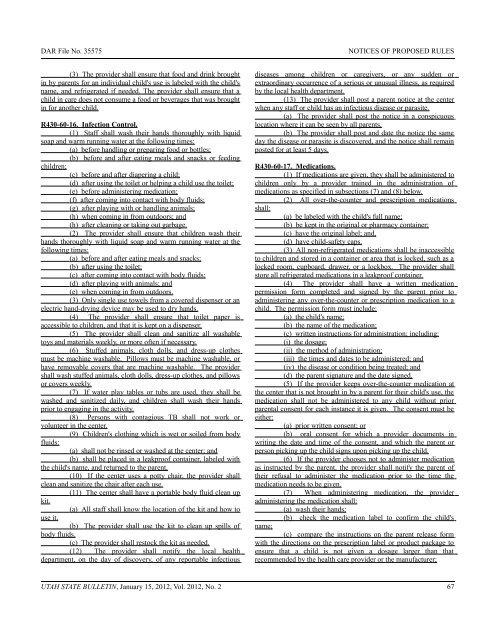
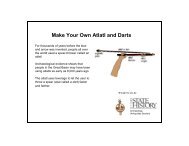

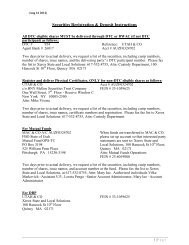
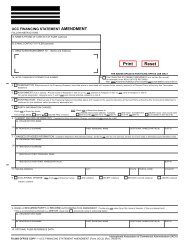
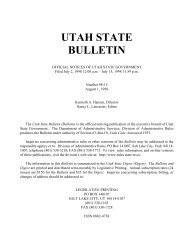
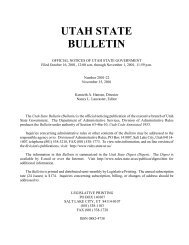

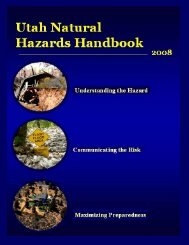
![Lynx avoidance [PDF] - Wisconsin Department of Natural Resources](https://img.yumpu.com/41279089/1/159x260/lynx-avoidance-pdf-wisconsin-department-of-natural-resources.jpg?quality=85)
